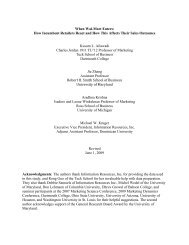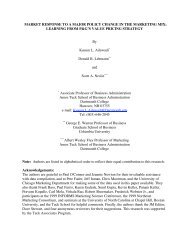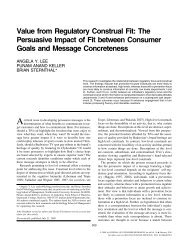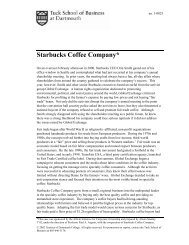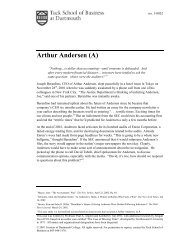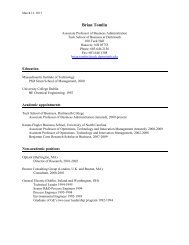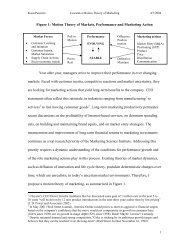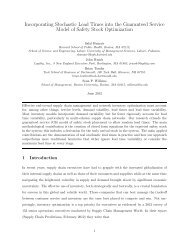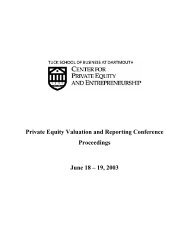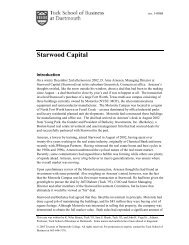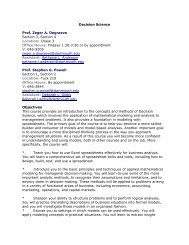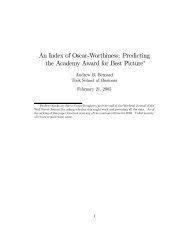tax notes international - Tuck School of Business - Dartmouth College
tax notes international - Tuck School of Business - Dartmouth College
tax notes international - Tuck School of Business - Dartmouth College
You also want an ePaper? Increase the reach of your titles
YUMPU automatically turns print PDFs into web optimized ePapers that Google loves.
to the dividend repatriation <strong>tax</strong> — a cost to the competitiveness<br />
<strong>of</strong> U.S. companies. Two <strong>of</strong> the United<br />
States’ major trading partners, Japan and the United<br />
Kingdom, are moving away from <strong>tax</strong>ing dividend repatriations,<br />
while a third major partner, the Netherlands,<br />
has few restrictions on income repatriations.<br />
The evidence is overwhelming that the U.S. <strong>international</strong><br />
<strong>tax</strong> system badly needs reform. I believe it is<br />
time for Congress to add the financial reporting and<br />
the competitiveness costs when it considers changing<br />
the <strong>tax</strong> treatment <strong>of</strong> the foreign pr<strong>of</strong>its <strong>of</strong> U.S. multinational<br />
corporations.<br />
Cross-Country Differences in Tax Systems<br />
Slemrod, along with coauthor Leslie Robinson <strong>of</strong><br />
the <strong>Tuck</strong> <strong>School</strong> <strong>of</strong> <strong>Business</strong> at <strong>Dartmouth</strong> <strong>College</strong>,<br />
took a global view <strong>of</strong> <strong>tax</strong> systems. They took advantage<br />
<strong>of</strong> new OECD information to analyze how variations<br />
in <strong>tax</strong> systems beyond the <strong>tax</strong> rate and the <strong>tax</strong><br />
base affect real economic behavior. Their study, ‘‘Measuring<br />
the Impact <strong>of</strong> Tax Systems on Economic Behavior<br />
Using New Cross-Country Data,’’ examined how<br />
variations in <strong>tax</strong> administration, enforcement, withholding,<br />
and corruption, for example, help explain<br />
variations in economic behavior across countries.<br />
‘‘Tax systems are multidimensional,’’ Robinson explained.<br />
‘‘Ignoring these differences may skew our view<br />
<strong>of</strong> how <strong>tax</strong> rates affect economic behavior. Leaving out<br />
important aspects <strong>of</strong> <strong>tax</strong> systems may bias estimated<br />
partial effects <strong>of</strong> <strong>tax</strong> rates, and/or miss entirely the effects<br />
<strong>of</strong> other <strong>tax</strong> system features.’’ For example, while<br />
prior research has shown that countries with high <strong>tax</strong><br />
rates tend to have a smaller informal sector, Robinson<br />
noted that the <strong>tax</strong> rate impact largely disappears once<br />
<strong>tax</strong> administration is taken into account. Somewhat<br />
counterintuitively, she found that although countries<br />
with high penalty rates have a smaller informal<br />
economy, countries that use extensive withholding systems<br />
have larger informal sectors.<br />
The reason, she suggests, is that withholding systems<br />
make it less attractive to work in the formal sector,<br />
because withholding makes it difficult to avoid paying<br />
<strong>tax</strong>es. Given that more corrupt countries exhibit<br />
greater use <strong>of</strong> withholding, that may partially explain<br />
why prior research has found a strong positive association<br />
between corruption and the informal sector.<br />
One main benefit <strong>of</strong> Slemrod and Robinson’s paper<br />
is that it references a 2006 OECD report 11 that provides<br />
<strong>international</strong>ly comparable data on the aspects <strong>of</strong><br />
<strong>tax</strong> systems in 30 OECD countries and 14 non-OECD<br />
countries.<br />
11 For the report Tax Administration in OECD and Selected Non-<br />
OECD Countries: Comparative Information Series, see Doc 2006-22140<br />
or 2006 WTD 210-10; for related coverage, see Tax Notes Int’l,<br />
Sept. 25, 2006, p. 1046, Doc 2006-19457, or2006 WTD 180-2.<br />
HIGHLIGHTS<br />
It’s no surprise that <strong>tax</strong> systems vary significantly<br />
across countries — some countries have effective <strong>tax</strong><br />
administrations, while others have weak administrations;<br />
some countries tend to rely on withholding,<br />
while others rely on self-assessment; some countries<br />
have strong debt collection powers, while others have<br />
low ratios <strong>of</strong> <strong>tax</strong> administrators per worker.<br />
Until the OECD published its data, researchers had<br />
no comparable cross-country information on how <strong>tax</strong><br />
systems varied, other than in their rates and their<br />
bases, and so could not examine the factors that explained<br />
why <strong>tax</strong> systems varied across countries. Slemrod<br />
and Robinson used the OECD data to show that<br />
<strong>tax</strong> system differences affect real economic behavior,<br />
because they affect how the <strong>tax</strong>payer perceives the expected<br />
<strong>tax</strong> burden triggered by its actions.<br />
The authors also explore a well-known <strong>tax</strong> fact:<br />
Rich countries levy more <strong>tax</strong>es per capita than poor<br />
countries. The OECD data confirm that, but also show<br />
that <strong>tax</strong> systems in high-income countries tend to share<br />
some characteristics and that there may be underlying<br />
factors about those countries that explain the <strong>tax</strong> burden.<br />
Relative to low-income countries, high-income countries<br />
impose withholding and reporting on fewer types<br />
<strong>of</strong> income, have fewer powers to facilitate debt collection,<br />
impose lower penalties, are less likely to use selfassessment<br />
principles, and hire more <strong>tax</strong> administrators,<br />
but they do not spend significantly more on<br />
administrative costs as a share <strong>of</strong> income.<br />
For example, Luxembourg, Iceland, and the Netherlands<br />
are in the top per capita income quartile but tend<br />
to fall in the lowest quartiles for penalty rates, withholding<br />
<strong>tax</strong>es, and information reporting. Chile, China,<br />
and South Africa fall in the lowest income bracket but<br />
tend to fall in the highest brackets for imposing penalties,<br />
levying withholding <strong>tax</strong>es, and relying on information<br />
reporting.<br />
Those correlations suggest that high-income countries<br />
tend to design their <strong>tax</strong> systems in ways that explain<br />
why those countries have a relatively high <strong>tax</strong><br />
burden. As Robinson noted, an analysis that considers<br />
only <strong>tax</strong> rates will miss the effect <strong>of</strong> other factors that<br />
may affect the size <strong>of</strong> the informal economy and may<br />
bias the estimates <strong>of</strong> how <strong>tax</strong> rates affect <strong>tax</strong> burdens.<br />
Robinson said it might be a variation in <strong>tax</strong> system<br />
design that is correlated with national income, rather<br />
than national income itself, that affects a country’s <strong>tax</strong><br />
burden.<br />
In conclusion, Slemrod emphasized: ‘‘Leaving out<br />
consideration <strong>of</strong> administrative issues can lead to severely<br />
biased measures <strong>of</strong> the role <strong>of</strong> <strong>tax</strong> rates in the<br />
economy.’’<br />
♦ Joann M. Weiner is a contributing editor to Tax<br />
Analysts. E-mail: jweiner@<strong>tax</strong>.org<br />
TAX NOTES INTERNATIONAL FEBRUARY 2, 2009 • 375<br />
(C) Tax Analysts 2009. All rights reserved. Tax Analysts does not claim copyright in any public domain or third party content.



